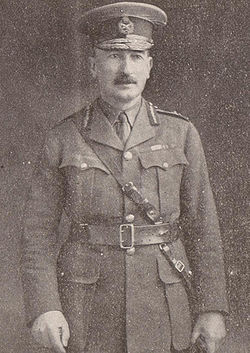- Claud Jacob
-
Sir Claud Jacob 
Lieut-General Claud William JacobBorn 1863 Died 1948 (aged 84 or 85) Allegiance  United Kingdom
United KingdomService/branch  British Army
British ArmyYears of service 1882–1925 Rank Field Marshal Commands held II Corps
Indian ArmyBattles/wars World War I Awards Knight Grand Cross of the Order of the Bath
Knight Grand Commander of the Order of the Star of India
Knight Commander of the Order of St Michael and St GeorgeField-Marshal Sir Claud William Jacob GCB GCSI KCMG (1863–1948) was a British Army officer who served in the First World War.
Contents
Military career
Jacob was born on November 21, 1863, at Mahidpur in the Bombay Presidency of British India, to Major-General William Jacob and Eliza Jacob.[1]
From Sherborne School he passed into Sandhurst and was commissioned into the Worcestershire Regiment in 1882.[1] At the end of 1884, stationed at Quetta, he secured his transfer to the Indian service and was posted to the 30th Regiment (Jacob’s) Bombay Native Infantry also known as 3rd Belooch Regiment (now 12 Baloch). From there, he was posted to the 24th (Baluchistan) Regiment of Bombay Infantry (now 6 Baloch).[1] He first saw action with the Zhob Valley expedition of 1890.[1] He was subsequently selected to command the Zhob Levy Corps, which kept the peace in the North West Frontier Province along the Waziristan and Southern Afghanistan border.[1]
In 1912, he was appointed GSO1 of the Meerut Division.[1] At the outbreak of World War I in 1914, an Indian corps was sent to France; Jacob went with the Meerut division.[1] He became the only Indian officer to remain in France and rise to a high command there. Just before Christmas of 1914, a critical situation arose when the troops were badly shaken by a German attack: he acted with considerable bravery.[1]
At the beginning of 1915, he was appointed to command the Dehra Dun Brigade, and led it at Neuve Chapelle in March.[1] In September, he was given the Meerut division and committed to the fruitless and costly subsidiary action of Pietre at the time of the battle of Loos.[1] In November, when the Indian Corps was preparing to leave the Western front, he was appointed to take over the 21st Division of the "New Armies" on November 18, 1915.[1] He was created CB in this year.[1]
In September 1916, he was appointed to command II Corps in the Fifth Army.[1] During the Battle of the Somme, he carried Thiepval by an admirably planned assault.[1] They performed well at the Ancre operations and in the pursuit of the Germans to the Hindenburg Line in 1917.[1]
Having been promoted to lieutenant-general in 1917,[1] he commanded a corps of the British Army of the Rhine during the occupation there.[1] In 1920, he returned to India as Chief of the General Staff.[1] In the course of that year, he was promoted to general[1] and appointed ADC to King George V.[1] In 1924, he returned home to England, but then in November was given the Northern Command in India.[1] When Lord Rawlinson died in the following year, he acted temporarily as Commander-in-Chief, India.[1] Many anticipated that the succession would fall upon him, and this was believed to be the desire of the military authorities in London, but they failed to make it sufficiently clear. Thus the choice fell on Sir William Birdwood instead, and in November Jacob returned home again to take up the appointment of Military Secretary to the India Office.[1] He was promoted field marshal in November 1926[1] and remained at the India Office until May 1930. His last official post was that of Constable of the Tower of London,[1] which he held from 1937 to 1943. He was appointed KCMG in 1919, KCSI in 1924, GCB in 1926 and GCSI in 1930.
Jacob died on 2 June 1948 at the age of eighty-four. He was the Colonel of 2nd Battalion The Baluch Regiment (now 7th Battalion The Baloch Regiment). His medals and decorations are on display in the Officers Mess of Baloch Regimental Centre, Abbottabad, Pakistan.
Family
In 1894, he married Clara Pauline Wyatt, daughter of the Reverend J. L. Wyatt, well known as a missionary and student of oriental languages in India, and also a lecturer in Tamil at Cambridge University from 1895 to 1929.
The couple had one son, Edward Ian Claud Jacob, who later became Assistant Military Secretary of the War Cabinet and Director-General of the BBC. Their daughter, Aileen Swinton Jacob, born on 5 August 1895, died on 14 January 1907.
References
- Obituary in The Times 3/6/1948
- Dictionary of National Biography, Vol 29, p542-543
External links
Military offices Preceded by
G. T. Forestier-WalkerGeneral Officer Commanding the 21st Division
1915–1916Succeeded by
David CampbellPreceded by
Charles FergussonGOC II Corps
September 1916–November 1918Succeeded by
Post DisbandedPreceded by
Henry RawlinsonCommander-in-Chief, India
1925Succeeded by
William BirdwoodPreceded by
Sir Alexander CobbeMilitary Secretary to the India Office
1926–1930Succeeded by
Sir Alexander CobbeHonorary titles Preceded by
Baron MilneConstable of the Tower of London
1943–1948Succeeded by
Baron ChetwodeCategories:- 1863 births
- 1948 deaths
- Sandhurst graduates
- Worcestershire Regiment officers
- British Field Marshals
- British Commander-in-Chiefs of India
- Indian Army World War I generals
- Knights Grand Cross of the Order of the Bath
- Knights Grand Commander of the Order of the Star of India
- Knights Commander of the Order of St Michael and St George
- Old Shirburnians
Wikimedia Foundation. 2010.
